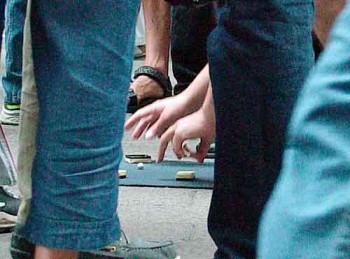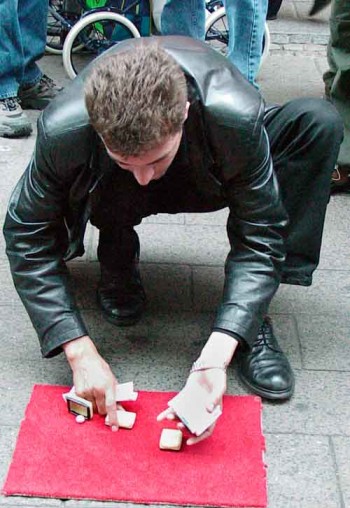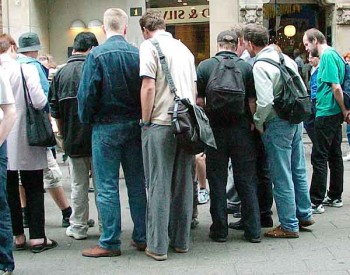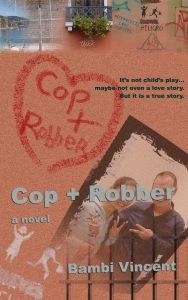Pavement wagers.

Copenhagen’s pedestrian shopping street is an ideal venue for the three-shell game, also called the pea game. Several competing crews set up there. They choose locations in the middle of a block along the narrow lane, which is swarming with jolly people from all over the world, shopping, slurping ice cream, and munching ambrosial Belgian waffles as they meander.
Three-shell game
A pair begins the game: a barker, and an operator. The operator drops to his knees, produces a small rubber mat not much bigger than a mousepad, and begins manipulating his pieces. Instead of the traditional walnut shell halves, he uses three matchbox trays reinforced with tape. His pea is an aluminum foil ball.
He slides the boxes madly around his mat, his hands a blur.
“Lef’, ri’, mi’l! One, two, three. Where’za ball?” He is sloppy—on purpose? One box goes sliding off the mat.
Immediately, a man places a bet and wins. A shill. Another man, another bet, a loss. Laughter rings out, but it sounds hollow and false. Hands fly over the mat and in the process, a box is briefly tipped, revealing the ball.
Quickly, an audience gathers. Everybody knows: a crowd draws a crowd. Excitement builds. Money changes hands. Bills are flashed and stashed.
“Totto-lotto, mini-casino! Wanna play? Twenny bucks!”
“Just looking.”
“Lookie-cookie. Sir! Wanna play? Where’za ball?”
The barker’s narration lures. The operator’s manipulation tempts. Imagined winnings seduce. It looks so easy: you can see the ball! Bets are placed: an easy win, a stupid loss… and soon enough, a tourist tries.

Five team members immediately close around him. They joke in any language, whatever is called for. A moment of suspense and camaraderie is staged. The operator is on the ground with his game, kneeling before his rubber mat, hunched over his boxes and ball.
“One, two, three, four. Lef’, ri’, mi’l! Where’za ball?” He’s tightly surrounded by the six standing men: the barker, the transitory player, and some shills. For a moment, no one else can see the game. The player chooses, a cry goes out in sympathy. The circle opens and the spectators are once again included as the loser slinks away.
But wait! Arms around the player’s shoulders, a conspiratorial back-pat. “You can do it! One more time, double or nothing!” So encouraging, so friendly, who’d guess these guys were in on it? Moments later, the player turns away, shakes his head, wonders how he could have lost so much so quickly.
Bob and I run after him.
“How much did you lose?”
“Fifteen hundred crowns!” About $260.
“Where’re you from?”
“Bhutan.”
“Why did you play?”
“I’ve never seen this game. It looked fun.”
“This is one game you can never win.”
“I know that now!” He hikes up his backpack and strides away.
Bob and I follow our noses to a waffle stand and wait for a fresh one hot off the iron. A rosy-cheeked girl hands it over, steaming and blackened, caramelized surface stuck to its parchment wrapper. Standing on a street corner, we savor the chewy sweetness of this European street snack. It has no relation to American waffles.
“See the guy in the pink jacket? Bob points with his chin, chewing.
“No.”
“There near the trash can.”
“That’s an orange jacket.” I reach for the waffle.
“Orange, then. He’s a spotter.”
“For the three-shell guys? How can you tell?”
“Just watch him. And his partner over there, in plade.”
“Plaaaaad.”
“Plaaaaad.” He wants to get the word right next time. But he won’t. “They’re looking for police. They were there before, too.”
We finish the waffle and watch a while longer.

“Now!” Bob says, and we’re off. The orange and plaid guys walk full speed up the lane, weaving deftly through the oblivious crowd. We follow in their wake.
The spotters reach the tight knot of people gathered around their colleagues, but they don’t stop. They don’t even pause. They hurry to the next corner, to alert their bookend pair of spotters. Yet, the gaming gang has seen them and that’s all the signal they need. They scatter. In the blink of an eye the game is over, the gang is gone, and the crowd is left wondering what they were gathered for, if anything at all.
This is Part 1. Read Part 2.
Excerpt from Travel Advisory: How to Avoid Thefts, Cons, and Street Scams
Chapter Eight: Con Artists and their Games of No Chance







No comment yet, add your voice below!